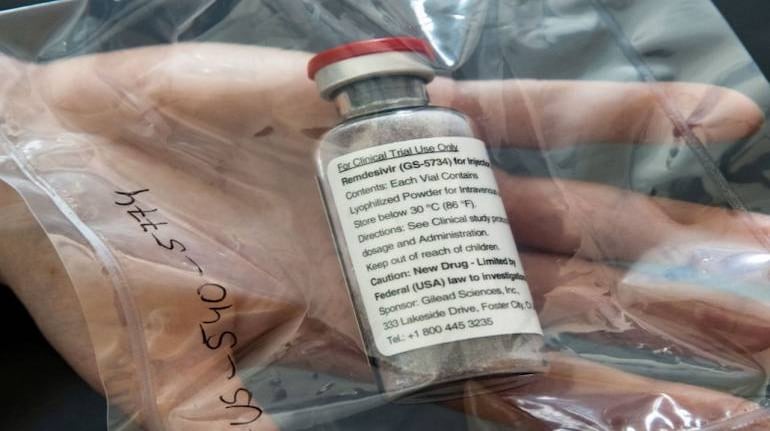



Amid the second wave of COVID-19 cases in India, multiple states, including Maharashtra, Gujarat and Delhi, have been flagging a major shortage of anti-viral drug Remdesivir.
The shortage prompted the Centre government to halt the export of the drug and Remdesivir active pharmaceutical ingredients (APIs) till the COVID-19 situation improves.
Further, to ensure easy access of the drug to hospitals and patients, all domestic manufacturers of Remdesivir have been advised to display on their website details of their stockists and distributors.
Track this LIVE blog for latest updates on the coronavirus pandemic
What led to the Remdesivir shortage?
As per the Union Health Ministry, seven Indian companies are producing the injection under the voluntary licensing agreement with M/s. Gilead Sciences, USA. They have an installed capacity of about 38.80 lakh units per month.
Gilead has signed licensing deals with Cipla, Dr Reddy's Laboratories, Hetero Labs, Jubilant Life Sciences, Mylan, Syngene and Zydus Cadila to manufacture Remdesivir.
The recent spike in COVID-19 cases and subsequent increase in hospitalizations have lead to an increase in demand for the drug as it is used to treat patients with severe complications.
"As of April 11, India has over 11.08 lakh active cases and they are steadily increasing. This has led to a sudden spike in demand for Remdesivir injection used in the treatment of COVID patients," the Union Health Ministry said.
It further said that there is a potential for further increase in this demand in the coming days.
Besides, black marketing has also been reported in several states amid a shortage. In a letter to the Drug Controller General of India (DCGI), LocalCircles pointed out that in early April, many posts and comments received from various cities of India have quoted the drug selling for as high as Rs 50,000 over 10 times of the retail price of the drug.
"Once again, certain medical shops have been telling buyers that the medicine is in short supply but can be made available if they are ready to pay a premium," the letter said.
Additionally, many persons, including hospital staff and medical shop owners, have been arrested over the week for selling Remdesivir injections at a much higher cost than its maximum retail price (MRP).
In Maharashtra, two employees of separate hospitals were arrested for trying to sell the drug at rates ranging from Rs 5,000 to Rs 10,000 per vial.
A medical store in Madhya Pradesh was also sealed for allegedly selling the injections at Rs 18,000 per vial.
What is the government doing about it?
In addition to prohibiting the export of Remdesivir, the government has asked drugs inspectors and other officers to verify stocks, check malpractices and also take other effective actions to curb hoarding and black marketing.
The Department of Pharmaceuticals has also contacted domestic manufacturers to ramp up the drug's production to meet the increase in demand.
Read: Remdesivir shortage in Nagpur; Gadkari dials Sun Pharma chief
In Maharashtra, India's worst-affected state due to COVID-19, the government has set up district-level control rooms to ensure a smooth supply of Remdesivir injections and prevent hoarding and black-marketing of the drug.
Maharashtra's health services commissioner Ramaswami N, in a letter dated April 9, had asked all district collectors to set up control rooms to streamline the supply of the key anti-viral drug.
What's the latest controversy in Maharashtra?
Maharashtra’s Leader of Opposition and former chief minister Devendra Fadnavis has alleged the state government was harassing a Remdesivir supplier from neighbouring Union Territory of Daman because Bharatiya Janata Party (BJP) leaders had approached him for the antiviral medication’s supply to the state.
Mumbai Police on April 17 had questioned a pharmaceutical company’s director over alleged excess Remdesivir stock but allowed him to leave after he produced necessary documents, reports suggest.
Maharashtra Home Minister Dilip Walse Patil on April 18 accused the BJP of trying to pressurise Mumbai Police and interfere in their work, and warned that such attempts will not be tolerated. Talking to reporters, Walse Patil said the city police had received a specific input that 50,000 vials of Remdesivir were being brought to the city, and confirmed that the director of Bruck Pharma was called for questioning a day earlier in that connection.
However, Fadnavis along with their colleagues, went to the police station and asked the officials as to why the company director was called and for what, Walse Patil said.
The political slugfest started on April 17 when state minister Nawab Malik alleged the Centre was pressurising some Remdesivir producers to not sell their stock in Maharashtra.
Joining state BJP leaders, two union ministers hit back at the Maharashtra government, calling these allegations "a lie" and termed them an attempt to politicise the pandemic.
How effective is Remdesivir against COVID-19?
India has approved Remdesivir under the National Clinical Management Protocol for COVID-19 which was developed after many interactions by a committee of experts. The protocol acts as the guiding document for the treatment of COVID-19 patients in India.
In the protocol, Remdesivir is listed as an investigational therapy, i.e. where informed and shared decision making is essential, besides taking note of contraindications mentioned in the detailed guidelines.
However, WHO in November 2020 advised against the use of anti-viral drug saying there is "currently no evidence that Remdesivir improves survival and other outcomes in these patients".
The drug has been found to have some benefit in several other randomised, controlled clinical trials.
In one large controlled trial in the US, the drug was found to have shortened recovery time by about a third in severely ill, hospitalised adults with COVID-19.
Click here for Moneycontrol’s full coverage of the coronavirus pandemic
Discover the latest Business News, Sensex, and Nifty updates. Obtain Personal Finance insights, tax queries, and expert opinions on Moneycontrol or download the Moneycontrol App to stay updated!
Find the best of Al News in one place, specially curated for you every weekend.
Stay on top of the latest tech trends and biggest startup news.